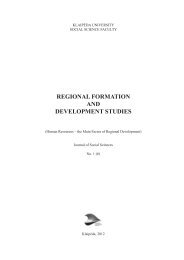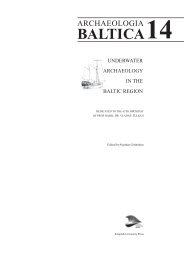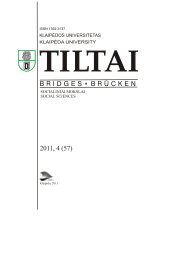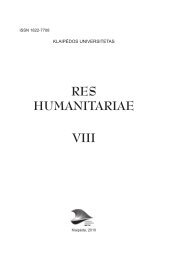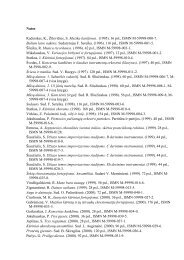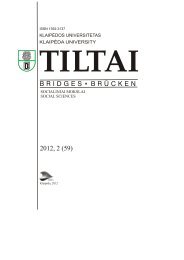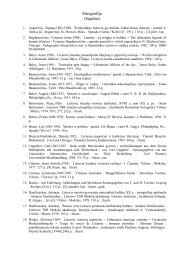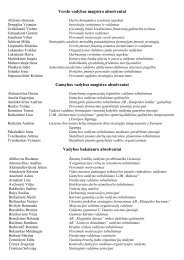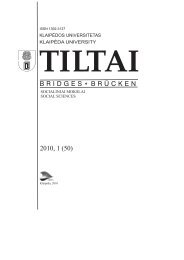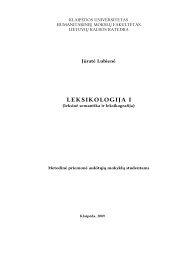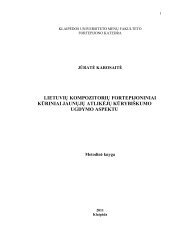BALTICA10
BALTICA10
BALTICA10
Create successful ePaper yourself
Turn your PDF publications into a flip-book with our unique Google optimized e-Paper software.
Cosmic Catastrophes and<br />
Cultural Disasters in<br />
Prehistoric Times?<br />
The Chances and<br />
Limitations of a Verification<br />
BARBARA<br />
RAPPENGLÜCK<br />
VIII. NEW TECHNOLOGIES AND<br />
METHODS IN CULTURAL ASTRONOMY<br />
Cosmic catastrophes and cultural<br />
disasters in prehistoric times?<br />
THE Chances and limitATIONS<br />
of a verification<br />
BARBARA RAPPENGLÜCK<br />
Abstract<br />
In the past three decades cosmic events such as supernovae and the impact of large meteorites have undergone a remarkable<br />
renaissance in being considered as a trigger of radical change, not only on geological timescales but also among prehistoric<br />
cultures. In such theories, archaeological horizons indicative of destruction events are combined with evidence from dendrochronology,<br />
ice-core analysis, mythical traditions etc. and are put forward as evidence for cultural disasters caused by cosmic<br />
events. This paper critically scrutinizes the underlying concepts of “cosmic catastrophe” and “cultural disaster” as well as the<br />
methods that are meant to corroborate them. Special emphasis is placed upon the limitations that show up in analyzing myth<br />
and folklore.<br />
Key words: catastrophe, cultural downturn, prehistory, supernova, impact, geomythology, myth.<br />
268<br />
Introduction<br />
In the 1980s the idea achieved prominence that the impact<br />
of a large asteroid had caused the extinction of the<br />
dinosaurs and the end of the Cretaceous Period, thus<br />
heralding the revival of the 19 th -century geological<br />
concept of catastrophism. The term “catastrophism”<br />
refers to the theory that sudden, short-lived, violent<br />
events such as eruptions of volcanoes, extreme floods,<br />
or earthquakes were essential triggers for geological<br />
processes of change. In the new hypothesis, the impact<br />
of large meteorites or comets became seriously considered<br />
as a potential agent in catastrophism. This conjecture<br />
was further fuelled by the observable break-up<br />
of the comet Shoemaker-Levy 9 and the impact of the<br />
fragments into Jupiter in 1994. More and more consideration<br />
was given to the question of whether supernovae,<br />
dense debris from comets or the impact of large<br />
meteorites could not only trigger geological processes<br />
but could also pose a threat to human civilizations and<br />
might have influenced history. Within the last twenty<br />
years a number of publications have presented evidence<br />
that claims to show the catastrophic effects of<br />
such cosmic events on prehistoric or ancient civilizations,<br />
mostly with worldwide or at least continent-wide<br />
consequences. We can briefly summarize five typical<br />
theories.<br />
• Firestone et al (2006): The debris of a supernova<br />
put a dramatic end to the Clovis culture in North<br />
America in about 11000 BC.<br />
• Allan and Delair (1997): The products of a supernova<br />
completely disarranged the solar system and<br />
caused a world-wide catastrophe in 9500 BC.<br />
• Tollmann (1993): The break-off of a gigantic comet<br />
caused multiple impacts and world-wide catastrophes<br />
in 7750 BC. All major religions are an<br />
attempt to cope with this apocalyptic experience,<br />
as are many cultural monuments (Stonehenge, the<br />
pyramids, etc.).<br />
rd<br />
• Clube and Napier (1982): Since the 3 millennium<br />
BC, clouds of cometary debris (Taurids) have produced<br />
impacts that affected the Earth and caused<br />
dust-events that resulted in worldwide climatic<br />
downturns. Major celestial gods originally represented<br />
comets; and cultural/political crises coincided<br />
with phases of increased meteoritic activity.<br />
• Baillie (2000): Closely passing comets or clouds<br />
of cometary debris caused worldwide climatic<br />
downturns in particular years during the last three<br />
millennia; these events correspond to cultural/political<br />
changes.



